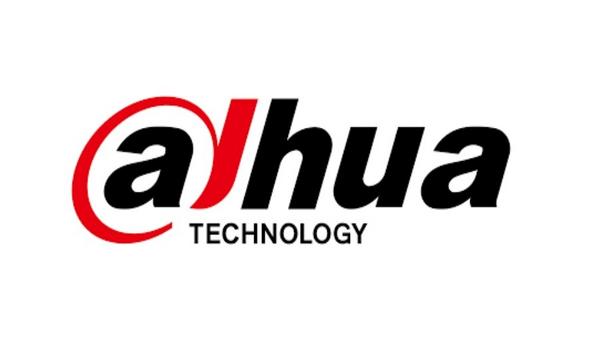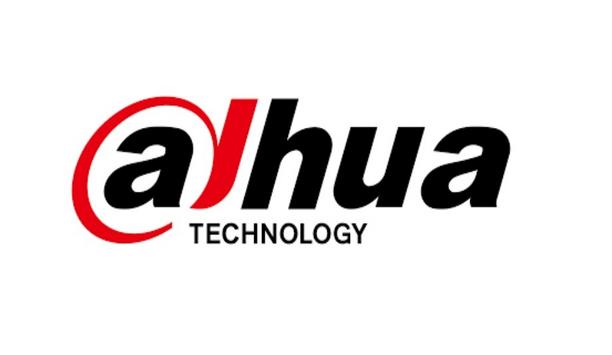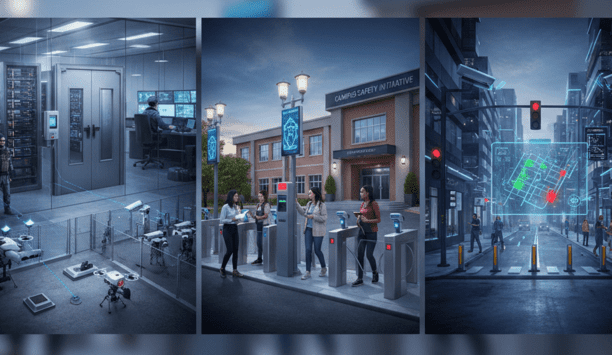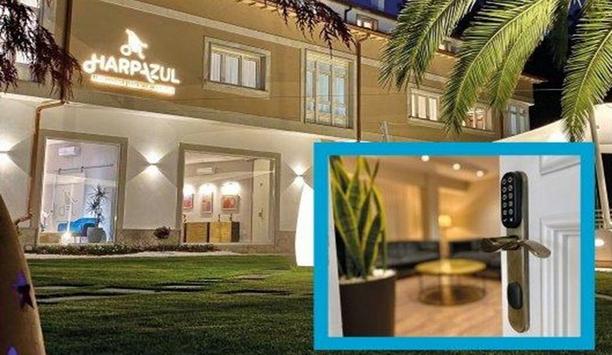Hospitals present a complex security challenge, in that they should always be welcoming public spaces. Indeed, in Sweden, many are ‘open’ during daylight hours. However, every hospital also has many sensitive assets that need securing around the clock.
Hospital security
Key assets include patients, doctors, nurses and support staff. The protection of drugs and confidential patient data is critical. In labs, sensitive – even dangerous – research or testing materials demand constant monitoring. Valuable lab equipment is, unfortunately, a target for theft and vandalism.
Then there are the extra logistical challenges; hospitals are often large and spread out and locks may need to integrate with fire detection, CCTV and other security systems. Not all site users are equal: medical staff, cleaners, patients and their visitors and countless temporary and contract workers all need access tailored to their specific and very different needs. Labs with a steady flow of visitors and contractors are safer if access is managed with time-limited ‘keys’ that can be revoked or revalidated when required. In case of any security breach, a thorough investigation is essential. In fact, it is often mandated for regulatory compliance.
We expect too much of the traditional lock and key if we expect it to meet such a challenge. What is the alternative – especially at a time when European healthcare budgets are tight, even more so in taxpayer-funded institutions?
Wireless access control solution
An access control system with wired doors and programmable RFID smartcards can solve many of these problems. However, conventional wisdom says access control is expensive and cannot be installed everywhere, due to the need for extensive cabling. The result? It only covers doors with very high security requirements. That needn’t be the case – if we cut the wires. Wireless locks are the most affordable way to extend access control throughout a site, greatly enhancing security for a small outlay.
What’s more, it does not require you to rip up the current security system and start again. Aperio® locks, for example, can easily ‘plug in’ to an existing access system, to bring monitored security to many more openings than would be possible with wired doors. They interoperate seamlessly with building management systems, linking wirelessly via a communications hub to the central system. Most importantly, they allow hospital managers to upgrade security and to give facility administrators more control over the premises – from monitoring pharmacy doors, to granting cleaners access only to their designated work areas, to revoking the access rights of any lost smartcard instantly.
Exterior and interior doors
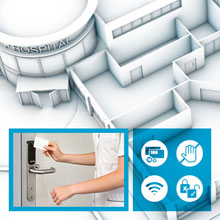 |
| Aperio® wireless locking technology meets the security and budget requirements of the modern hospital |
Critically from a compliance perspective, audit trails can be generated for any Aperio® lock, key or system user, at any time, making a proper investigation of any breach not just feasible, but straightforward. Aperio® components come in all shapes and sizes, for all kinds of hospital doors. The range includes locks, cylinders and escutcheons for wood, aluminium and glass doors. Aperio® can protect both exterior and interior doors, from certified fire and safety doors with mandatory security requirements to meeting and consulting rooms, labs, store rooms, offices and even server racks. The system can assign each a different level of security, if needed. Any installation can incorporate online or offline locks — or a mixture of both.
Cost efficiency
These locks can be installed quickly, without changing door hardware. There are YouTube videos under the search ‘Time challenge Aperio® cylinder’ which depict a technician complete an installation, from start to finish, in under 2 minutes. No wiring and no cabling means there is no electrician required and so no need to pay decorators to tidy up afterwards. Maintenance simply involves changing a standard lithium-ion battery once every 2 years – that’s it.
Wireless locks are cheaper to run, too. Unlike wired locks, Aperio® wireless locks only ‘wake up’ when prompted by a credential. They are not connected to the mains and use no power when inactive. One wireless electronic lock uses approximately 0.001 kWh of energy per year. A standard wired lock and reader uses 55.2 kWh.
Further, because any lost credential can simply have its access rights revoked, there is no longer any need for the expensive, time-consuming process of changing the locks when someone loses a physical key. Audit trails can be generated at the touch of a button, another saving on the substantial cost – in both staff time and money – of administering a mechanical master-key system.
Aperio® locks can protect both exterior and interior doors and the system can assign each a different level of security |
Wireless access control in action
Securing hospitals wirelessly has gone beyond the concept stage: Aperio® is already deployed in European hospitals. For example, in Belgium, Hospital Maria Middelares is a vital part of Ghent’s health infrastructure. In partnership with Nedap, around 700 doors in a new hospital building which opened in 2014 have been fitted with Aperio® Offline locks connected to a Nedap AEOS access control system. The deployment is 100 percent wireless, maintaining design aesthetics in the new build. Staff now open doors and access secure areas with a single smartcard using MIFARE RFID technology.
As part of a £35 million refurbishment of A&E and other urgent care services, Aintree University Hospital in Liverpool, England, sought an upgrade to its access control system. The trust needed flexible access control to streamline day-to-day security operations, extending public access while also maintaining restrictions to sensitive areas. They wanted a cost-effective, wire-free system, so installation could be done quickly and efficiently, without disrupting the day-to-day work of the hospital. ASSA ABLOY partnered with Grantfen and Inner Range to deliver a unified platform, which extended the Integriti access control system with ASSA ABLOY’s Aperio® wireless escutcheons.
Hospital security managers
It took a minimal outlay on Aperio® wireless locks to transform security at the Centre Hospitalier Universitaire de Grenoble. Approximately 20 Aperio® Online cylinders and escutcheons were installed in hospital buildings. Previously, the open nature of the site had posed a significant risk of intrusion and stealing hospital property had become widespread, until Aperio® wireless access control drastically reduced theft from the premises. Aperio® Online technology also ensures hospital security managers can access building information in real time, even removing a swipe card’s permission remotely, if required.
In France, the UK, Belgium and elsewhere, Aperio® gives doctors and nurses controlled access tailored to their shift patterns or working hours. Facility managers have real-time status information about their premises, with online or offline integration protecting wards, clinics and management offices. Audit trails for sensitive areas, such as labs and rooms where drugs or medical records are kept, are available on demand and hospital managers can extend access control to new buildings or bring monitoring to more areas as and when required, without breaking the bank. The key to upgraded, cost-effective hospital security? Cut the wires.
For further information, please go to: www.assaabloy.co.uk/aperioforhospitals
From facial recognition to LiDAR, explore the innovations redefining gaming surveillance



